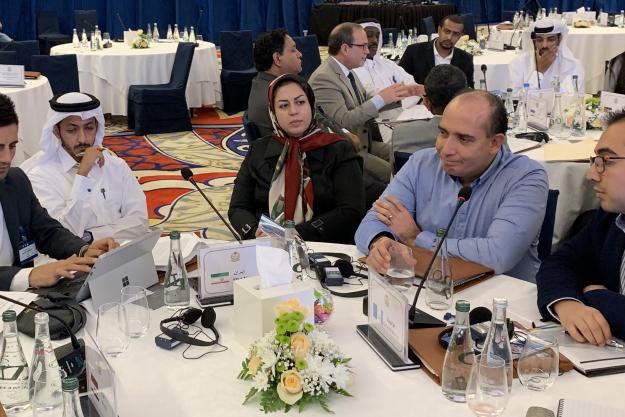
THE HAGUE, Netherlands — 28 October 2019 — Representatives from National Authorities and their chemical industry counterparts from 25 OPCW Member States met in Doha, Qatar, from 15-17 October 2019, for the Sixth Annual Meeting of Representatives of the Chemical Industry and National Authorities of States Parties to the Chemical Weapons Convention. A total of 44 international and over 20 national participants exchanged experiences and practices around the implementation of the industry verification regime.
In his opening remarks, the Chairman of the Qatar National Committee for the Prohibition of Weapons, H.E. Brigadier Hassan Saleh Al-Nesf, highlighted the significance of this annual meeting, stating that it “brings together representatives of two important pillars underpinning the optimal implementation of the Chemical Weapons Convention”, referring to the National Authorities on the one hand and the chemical industry on the other.
The meeting agreed a final report, which summarised key elements of the national practices presented, as well as outcomes of group discussions on “risk-based approaches” to verification. The report also summarised the ideas generated around tools to support National Authorities’ engagement with the chemical industry. The participants’ diverse backgrounds, and their experiences of Article VI implementation enriched the discussion.

The meeting was organised with voluntary contributions of the State of Qatar and through close cooperation between the OPCW Technical Secretariat and the Doha Regional Centre for CBRN Training.
Representatives of the following OPCW Member States participated in the event: Australia, Bulgaria, Burundi, Chile, China, Colombia, Democratic Republic of the Congo, Côte d’Ivoire, El Salvador, Guatemala, Iran, Iraq, Jordan, Kenya, Lithuania, Mexico, Myanmar, Namibia, Nigeria, Pakistan, Palestine, Peru, Qatar, Tajikistan and Togo.
The Annual Meeting has provided a unique forum for dialogue and sharing of best practice between National Authorities and the chemical industry around the world since 2014. The Technical Secretariat issued an official Note on 17 September 2019 (S/1793/2009) that provided an overview of the general outcomes of the five Annual Meetings held between 2014 and 2018, attended by 178 international and over 100 national participants from 49 States Parties.
Background
As the implementing body for the Chemical Weapons Convention, the OPCW, with its 193 Member States, oversees the global endeavour to permanently eliminate chemical weapons. Since the Convention’s entry into force in 1997, it is the most successful disarmament treaty eliminating an entire class of weapons of mass destruction.
Over 97% of all chemical weapon stockpiles declared by possessor States have been destroyed under OPCW verification. For its extensive efforts in eliminating chemical weapons, the OPCW received the 2013 Nobel Peace Prize.
More Information
Declarations and Inspections (Article VI Obligations) Training Course
